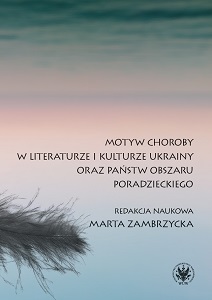Християнський контекст мотиву сліпоти-прозріння в "Повісті минулих літ" Нестора Літописця і "Kronice polskiej" Ґалла Аноніма
Christian Context of the Motif of Blindness and Enlightenment in "Tale of Bygone Years" by Nestor the Chronicler and "Polish Chronicle" by Gallus Anonymus
Author(s): Oksana Wiszniewska
Subject(s): Studies of Literature, Ukrainian Literature, Philology
Published by: Wydawnictwa Uniwersytetu Warszawskiego
Keywords: motif; symbol; paganism; Christianity; blindness; enlightenment
Summary/Abstract: The article analyses the motif of blindness and enlightenment in Old East Slavic literature (on the basis of the "Tale of Bygone Years" by Nestor the Chronicler) and Old Polish literature (on the basis of "The Polish Chronicle" by Gallus Anonymus). The main focus is on the blindness of two rulers – Prince Vladimir the Great of Kiev ("Tale of Bygone Years") and Prince Mieszko of Poland ("The Polish Chronicle" by Gallus Anonymus) and their wonderful enlightenment, revealing both commonalities and differences in the rendering of the motif of blindness and enlightenment. The sources of the stories about the blindness of Vladimir the Great and Mieszko are analysed, and it is found that the author of "Tale of Bygone Years" draws upon folk legends, while researchers of "The Polish Chronicle" put forward different hypotheses about its sources. It is determined that in both cases blindness should be understood not only as a physical affliction. The sudden loss of sight by Vladimir the Great ("Tale of Bygone Years") is a manifestation of spiritual blindness. The disease is interpreted as a symbol of the culmination of Vladimir’s life, when he had to choose between paganism and Christianity. Therefore, the recovery of sight has an obvious allegorical meaning: baptism is associated with light, enlightenment. Analysing "The Polish Chronicle" by Gallus Anonymus elucidates a symbolic meaning of the blindness of Mieszko, having to do with a country and a people who have long been in darkness. The enlightenment and recovery of sight by Mieszko become a premonition of the future of Poland, a kind of boundary between the past and the future, between paganism and Christianity. It is outlined that the moment of Christianisation (enlightenment) in both cases had not only personal but also state significance, as it contributed to the accession of Rus’ and Poland to the family of European states.
Book: Motyw choroby w literaturze i kulturze Ukrainy oraz państw obszaru poradzieckiego
- Page Range: 73-87
- Page Count: 15
- Publication Year: 2021
- Language: Polish, Ukrainian
- Content File-PDF

